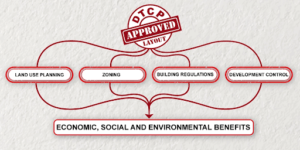Land development is a complex and highly regulated process that involves transforming raw land into valuable real estate assets. In many countries, including India, the Department of Town and Country Planning (DTCP) plays a pivotal role in governing land development activities. Understanding DTCP regulations is crucial for developers, investors, and anyone involved in the real estate industry.
This comprehensive guide aims to shed light on the key aspects of DTCP regulations, providing you with the knowledge needed to navigate the labyrinth of rules and ensure successful land development projects.

What is DTCP?
The Department of Town and Country Planning, commonly referred to as DTCP, is a government body responsible for regulating land use and development in various states and union territories of India. Its primary objective is to promote planned, sustainable, and orderly urban development.
DTCP is tasked with several crucial functions, including
- Land Use Planning: Determining the appropriate use of land for residential, commercial, industrial, and recreational purposes.
- Infrastructure Development: Ensuring that the necessary infrastructure, such as roads, sewage systems, and utilities, is in place to support urban growth.
- Zoning Regulations: Implementing zoning regulations to control the type of development that can occur in specific areas.
- Approval of Building Plans: Reviewing and approving building plans to ensure they comply with zoning and safety regulations.
Now, let’s delve into the key aspects of DTCP regulations:
Understanding Zoning Regulations
One of the fundamental components of DTCP regulations is zoning. Zoning involves dividing land into different zones or districts, each with specific regulations governing land use, building height, density, and setbacks. Common zoning categories include residential, commercial, industrial, and agricultural.
Developers must adhere to zoning regulations when planning and constructing buildings. These regulations help maintain the character and functionality of different areas within a city or region. For example, residential zones are typically reserved for housing, while commercial zones allow for businesses and retail establishments.
Before embarking on a land development project, it’s crucial to determine the zoning regulations applicable to your property. Consulting with local DTCP authorities and obtaining a zoning clearance certificate is a vital first step in ensuring compliance.

Land Use Planning
DTCP is responsible for creating land use plans that guide the development of cities and regions. These plans consider factors such as population growth, infrastructure needs, and environmental sustainability. They help in establishing a long-term vision for urban development.
As a developer or investor, it’s essential to align your project with the existing land use plans. Deviating from these plans can result in delays and regulatory challenges. Engaging with DTCP officials and local planning authorities can help you understand the broader development goals of the region and ensure that your project aligns with them.

Approval of Building Plans
Obtaining approval for your building plans is a critical step in the land development process. DTCP reviews building plans to ensure they comply with zoning regulations, safety codes, and environmental requirements. The approval process may vary from state to state, but it typically involves submitting detailed plans and documents for evaluation.
It’s essential to engage with qualified architects and engineers who are familiar with DTCP regulations to prepare your building plans. Working closely with DTCP officials during this phase can streamline the approval process and help you address any concerns or modifications required.

Environmental Clearances
Environmental sustainability is a growing concern in land development. DTCP regulations often require developers to obtain environmental clearances for projects that could impact the environment. This includes assessments of potential effects on air quality, water resources, and biodiversity.
To navigate environmental regulations, it’s advisable to conduct thorough environmental impact assessments (EIA) and engage with environmental consultants who can guide you through the clearance process. Compliance with environmental regulations not only ensures legal adherence but also contributes to sustainable development.
Infrastructure Development
Successful land development relies on robust infrastructure, including roads, utilities, and public amenities. DTCP plays a vital role in coordinating and overseeing the development of these essential elements.
Before commencing a development project, it’s essential to assess the adequacy of existing infrastructure and determine whether any upgrades or additions are necessary. Collaborating with local authorities and DTCP can help ensure that your project aligns with infrastructure development plans.
Compliance and Legal Requirements
Non-compliance with DTCP regulations can lead to legal troubles, project delays, and financial losses. To avoid these pitfalls, it’s crucial to stay informed about the latest regulatory updates and legal requirements.
Here are some key compliance considerations:
- Documentation: Maintain meticulous records of all approvals, clearances, and permits obtained from DTCP and other relevant authorities.
- Timelines: Adhere to project timelines and deadlines set by DTCP to avoid penalties and delays.
- Quality Control: Ensure that construction adheres to approved plans and meets quality standards outlined in DTCP regulations.
- Safety: Prioritize safety measures for workers and residents, in compliance with building codes and safety regulations.
- Environmental Responsibility: Implement sustainable and eco-friendly practices in line with environmental regulations.

Conclusion
Navigating DTCP regulations is an intricate process that requires careful planning and adherence to legal requirements. However, it’s a crucial step in ensuring the success and sustainability of land development projects. By understanding zoning regulations, land use plans, building approvals, environmental clearances, and infrastructure development, you can navigate the complex world of DTCP regulations with confidence.
Remember that successful land development is not just about meeting legal requirements; it’s also about contributing to the growth and development of communities in a sustainable and responsible manner. Engaging with local DTCP authorities, seeking expert advice, and staying updated on regulatory changes will help you achieve your land development goals while complying with DTCP regulations.
As you embark on your land development journey, remember that DTCP regulations exist to create vibrant, safe, and sustainable urban environments for everyone. By working within these regulations, you not only ensure the success of your projects but also contribute to the overall well-being of the communities you serve.

FAQ
- What is DTCP, and why is it important for land development?
DTCP stands for the Department of Town and Country Planning. It is a government body responsible for regulating land use and development in urban and peri-urban areas. Understanding DTCP regulations is crucial for land development because they define zoning, building codes, and other rules that govern how land can be used and developed in a given area.
- How do I check if my property falls under DTCP jurisdiction?
To determine if your property falls under DTCP regulations, you can visit the DTCP website or contact your local municipal office. They will provide you with information on zoning maps and regulations specific to your location. It’s essential to know the zoning classification of your property before starting any development project.
- What are the key zoning regulations under DTCP, and how do they impact my project?
DTCP regulations often include zoning codes that specify land use, building height, setbacks, and density restrictions. These regulations can significantly affect your development project. Understanding them is crucial to ensure compliance and avoid potential legal issues. Consulting with a local architect or planner can help you navigate these regulations effectively.
- What is the process for obtaining approvals and permits from DTCP for a land development project?
The process for obtaining approvals and permits for a land development project can vary depending on your location and the specific project details. Generally, it involves submitting an application, detailed plans, and other required documents to the local DTCP office. The DTCP will review your proposal to ensure it complies with zoning and building regulations before granting approvals.
- Are there any common challenges or pitfalls in dealing with DTCP regulations during land development?
Yes, there can be several challenges when dealing with DTCP regulations. Common pitfalls include not thoroughly researching and understanding the local regulations, failing to consult with professionals, and attempting to bypass the approval process. It’s essential to be patient, seek expert advice, and follow all the necessary steps to avoid costly delays and legal complications in your development project.
Remember that DTCP regulations can vary from one region to another, so it’s crucial to consult with local authorities and experts who are well-versed in the specific regulations applicable to your area. This will help ensure a smoother land development process while adhering to all necessary guidelines and requirements. To know more click the below link –https://syedsmartdeal.com/

